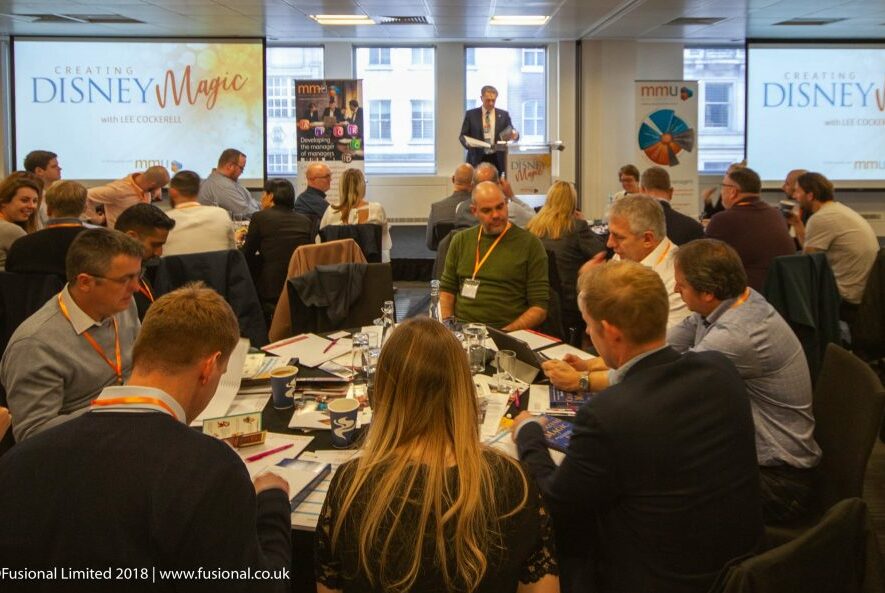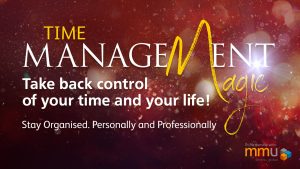

Having just signed off the short highlights reel from our recent event “Creating Disney Magic” with Lee Cockerell (which you can see here), it solidified three key highlights from Lee’s seminar about leadership lessons learnt from a life at Disney.
One
Committed, responsible, inspiring leaders create a culture of care, which leads to quality service, which leads to Guest satisfaction, which in-turn leads to measurable business results and a strong competitive advantage.
Even today, talk of “culture and engagement” can too often be seen as “fluffy” and “nice-to-do” rather than being integral to success. Lee’s focus on remembering that “everyone is important” reminds us that true inclusivity requires that everyone gets involved, whether that’s about sharing their ideas to solve problems or to drive performance even further.
Giving them a real sense of purpose “not just a job” means ensuring leaders articulate a clear “why” not just a “what”. Taking the time to build a strong line of sight between the everyday goals and activities that people undertake, and the wider objectives and reason for the organisation’s existence is time well spent in Lee’s view.
Lee shared Disney’s four Guest expectations, which every team (Cast) Member is expected to know
- Make me feel special
- Treat me as an individual
- Respect me
- Be knowledgeable
Not surprisingly these four expectations apply equally to the people who work in the Disney family as they do to the guests who visit the Disney Parks.
 Lee also provided a practical example of how Disney seeks to create a culture of Appreciation, Recognition and Encouragement or A.R.E for short. I’d encourage everyone to learn more about this by reading the relevant chapter in Lee’s book “Creating Magic” or the chapter summary that I recently compiled here on “Burn the free fuel” – which Lee describes as being a “fully sustainable fuel; one that builds self-confidence and self-esteem, boosts individual and team performance, and keeps an organisation running cleanly and smoothly”.
Lee also provided a practical example of how Disney seeks to create a culture of Appreciation, Recognition and Encouragement or A.R.E for short. I’d encourage everyone to learn more about this by reading the relevant chapter in Lee’s book “Creating Magic” or the chapter summary that I recently compiled here on “Burn the free fuel” – which Lee describes as being a “fully sustainable fuel; one that builds self-confidence and self-esteem, boosts individual and team performance, and keeps an organisation running cleanly and smoothly”.
Two
Being a leader means doing what has to be done, when it has to be done, in the way it should be done, whether you like it or not, and whether they like it or not.
I don’t think I’ve ever thought that being a leader is easy and certainly that position requires the individual to “choose”. And as we all know, you can never please all the people, all of the time, the decisions you make are likely to disappoint or perhaps frustrate people at times.
For me, Lee’s quote sharply puts into focus the need for leaders to get things done; to execute the plan (with excellence) and to help others to do the same. This is clearly meant in the context of influence and persuasion, not in a “it’s my way or the highway” approach to leadership.
Yes, there are times when a clear, directive style is appropriate, but this is best delivered by taking on board the first lesson I highlighted in this post, concerning involvement and purpose. People will willingly follow direction if they believe in the purpose of the action and they trust the individual’s motives for doing so.
There are many traits and behaviours that link great leaders in business, politics, sport, religion and so on. One thing we can all agree – these leaders actually DID something; they didn’t settle for the status quo and they inspired and encouraged others to follow them to achieve something new.
Three
Time management is about learning a system and a way of thinking that will enhance your ability to lead a highly productive, balanced and effective life. Most people don’t attempt to have a great life. Why? Because they settle for having a pretty good life or an OK life. Why settle for average when great is achievable?
 Lee is incredibly passionate about this topic and I’d go as far as saying that helping others to develop a system for how they plan and live their lives (at work and at home) is his driving force.
Lee is incredibly passionate about this topic and I’d go as far as saying that helping others to develop a system for how they plan and live their lives (at work and at home) is his driving force.
I couldn’t agree more on this point and I share his frustration that basic approaches to personal productivity and effectiveness are not taught in schools or indeed in many organisations, to the extent that the skills associated with time management deserve. I’m excited to be working with Lee as MMU adapts his book Time Management Magic into a one-day programme that we will be launching in early 2019.
As with any successful training intervention, the key is always the individual’s mindset and desire to want to change, to embed the relevant behaviours and to execute the related tasks on a consistent basis. From developing our children (“you can’t really fire your kids or wait for annual appraisal to give them feedback”) to the significance of planning for our retirement, Lee makes us think of the activities that won’t pay off for years, often decades. Another example includes the importance of taking care of our health, not just through exercise and diet, but also by participating in regular medical check-ups.
We all know that the day-to-day whirlwind of life distracts us from doing what’s important especially in the long-term. Indeed the “urgent” will nearly always trump the “important” without focus or a system to achieve these things. The Time Management Magic programme is about helping people develop an operating system which leads them to achieve the things that matter most to them. Not someday – as this is not a day of the week! – but in a deliberate and focused way, one step at a time.
Ultimately, as Lee says:
Life is all about your attitude. You’re the author of your own story. You create your own magic!
If you’re interested in learning more about the launch of the one-day “Time Management Magic” workshop in the UK, please drop us a note here and you’ll be among the first to know the details!


